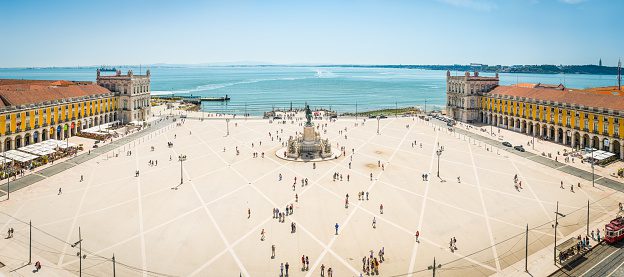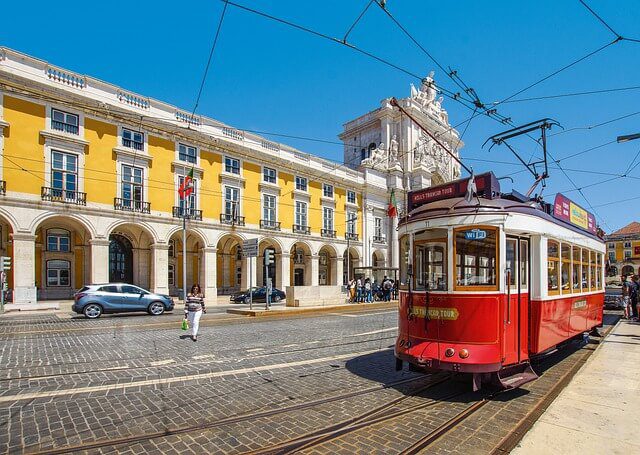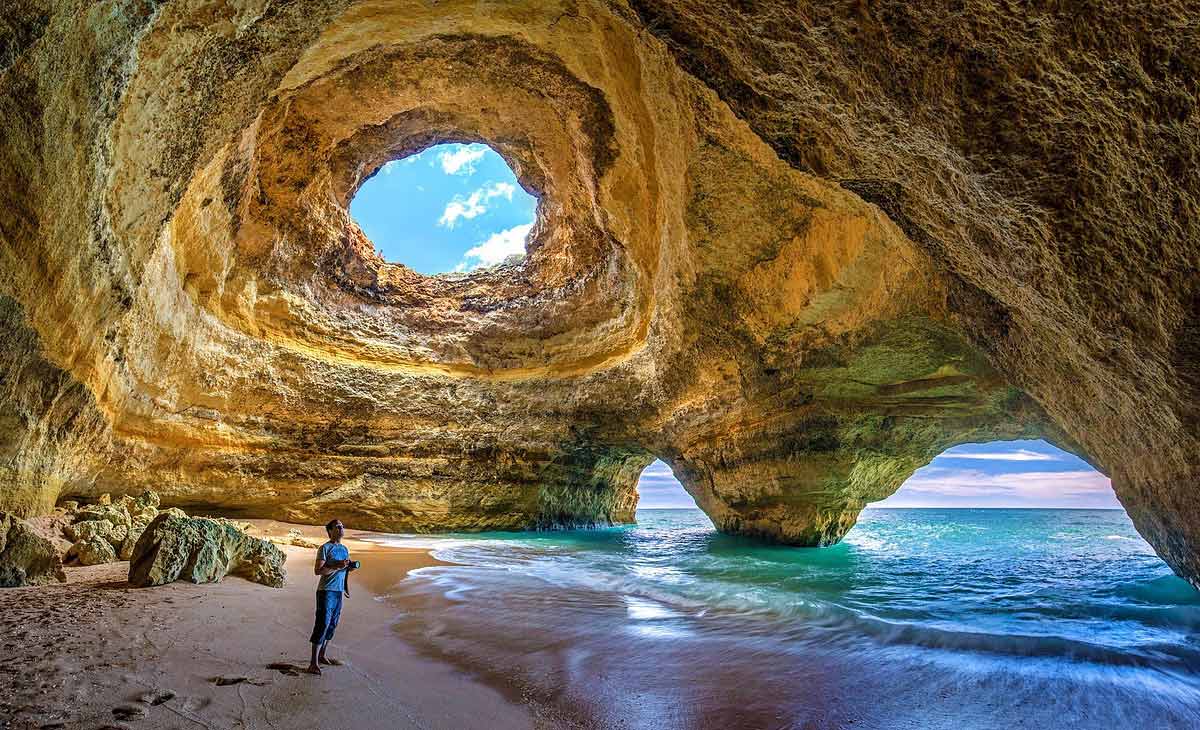Portugal is a beautiful country with a rich history, culture, and vibrant lifestyle. From its stunning beaches to its delicious cuisine, there are countless reasons why Portugal is a great place to call home. In this blog, we will explore the top 15 reasons why you should consider settling in Portugal. Whether you’re looking to retire, start a business, change your passport, look for the best free healthcare and education for your child, or just enjoy a new lifestyle, Portugal has something for everyone.
If you are tired of the cold, grey winters and high cost of living in your current country, then Portugal has a Mediterranean climate with mild winters and warm summers, making it a great place to live year-round. It is known for its low cost of living and good value for money. Portugal is relatively inexpensive compared to other European countries and offers a high standard of living without breaking the bank. Its rich culture and history are reflected in its architecture, art, and music. You can visit medieval castles and Gothic cathedrals and enjoy the vibrant street art. And if you are a foodie, it will be a paradise for you. Portuguese cuisine is varied and delicious, from fresh seafood to hearty stews, there is something for everyone.
Portugal is also known for its beautiful beaches and crystal-clear waters. Portugal has some of the most beautiful beaches in the world, from the Algarve to the Azores there are miles of golden sandy beaches to discover. So if you are looking for a change of pace or a new adventure, this beautiful country on the Atlantic coast of Europe has a lot to offer everyone. In this post, we will explore the top 15 reasons why Portugal is a great place to call home. Read on to learn more about the top 15 factors and the basis of the reasons why you should settle in Portugal.
#1. Pleasant weather

Portugal has a Mediterranean climate which means that it has mild winters and warm summers. This makes it a great place to live all year round. Did you know that Portugal is one of the sunniest countries in Europe? With an average of 3,000 hours of sunshine per year, you’ll never have to worry about those cold, grey days again. Another interesting fact is that Portugal has the warmest sea temperature in Europe, which makes it perfect for swimming and water activities even in the colder months.
Also Read: How To Get Portugal Digital Nomad Visa
#2. Low cost of living
Portugal is relatively inexpensive compared to other European countries. Living costs are low and the country offers great value for money. Did you know that Portugal is the eighth most affordable country in Europe? This means that you’ll be able to enjoy a high standard of living without breaking the bank. Another interesting fact is that Portugal has no inheritance tax, which makes it a great place to retire and leave behind a legacy for your loved ones.
Also Read: 10 Things You Need To Know Before Moving To Portugal
#3. Rich in Culture

Portugal has a rich culture and history that is reflected in its architecture, art, and music. You can explore medieval castles, and Gothic cathedrals and take in the vibrant street art. Did you know that Portugal is home to the world’s oldest bookstore, Livraria Bertrand? This bookstore has been in operation since 1732 and is a cultural landmark in Portugal. Another interesting fact is that Portugal has the oldest alliance in the world, the Treaty of Tordesillas, which was signed in 1494 and divided the New World between Spain and Portugal.
#4. Amazing Food

Portuguese cuisine is varied and delicious. From fresh seafood to hearty stews, there is something for everyone. Did you know that the famous Pastel de Nata, a traditional Portuguese custard tart, was created by monks in the 18th century? This pastry is a must-try for anyone visiting Portugal, and you’ll find them in almost every pastry shop in the country. Another interesting fact is that Portugal has the highest fish consumption per capita in Europe. This is due to the country’s coastline which stretches for more than 800 km and the abundance of fresh seafood.
Also Read: 8 Different Types Of Visas In Portugal 2023
#5. Beautiful Beaches

Portugal has some of the most beautiful beaches in the world. From the Algarve to the Azores, there are miles of golden sands and crystal-clear waters to explore. Did you know that Portugal has more than 800 km of coastline? This means that you’ll never run out of beaches to explore and enjoy. Another interesting fact is that Portugal has the longest bridge over the sea in Europe, the 25 de Abril Bridge, which connects Lisbon to the town of Almada. Here are a few famous beaches in Portugal with their facilities and best timing.
- Praia da Rocha: Praia da Rocha is a beautiful beach located in the Algarve region of Portugal. It is known for its golden sand and crystal clear waters, as well as the impressive cliffs that surround it. There are plenty of facilities on the beach, including sun loungers, parasols, and beach bars. The beach is open all year round, but the best time to visit is during the summer months when the weather is warm and sunny. During the peak summer months, the beach can get quite crowded with tourists.
- Praia do Camilo: Praia do Camilo is a stunning beach located in the Algarve region of Portugal. It is known for its beautiful natural setting, with rugged cliffs and caves that surround the beach. The beach is accessible via a steep staircase, but the effort is well worth it for the stunning views. There are several beach bars and restaurants on the beach, as well as sun loungers and parasols for rent. The beach is open all year round but the best time to visit is during the summer months.
- Praia do Guincho: Praia do Guincho is a beautiful beach located near Cascais, just outside of Lisbon. It is known for its long stretches of white sand and its strong waves, which make it a popular spot for surfers. There are plenty of facilities on the beach, including sun loungers, parasols, and beach bars. The beach is open all year round, but the best time to visit is during the summer months when the weather is warm and sunny.
- Praia de São Rafael: Praia de São Rafael is a picturesque beach located in the Algarve region of Portugal. It is known for its clear, blue waters and its beautiful natural setting. There are plenty of facilities on the beach, including sun loungers, parasols, and beach bars. The beach is open all year round, but the best time to visit is during the summer months when the weather is warm and sunny.
- Praia da Dona Ana: Praia da Dona Ana is a beautiful beach located in the Algarve region of Portugal. It is known for its stunning rock formations and the crystal-clear waters. There are plenty of facilities on the beach, including sun loungers, parasols, and beach bars. The beach is open all year round, but the best time to visit is during the summer months when the weather is warm and sunny.
Also Read: 10 Countries With Moderate Temperature
#6. Delicious wine

Portugal is known for its delicious wine, particularly port wine. The Douro Valley is a UNESCO World Heritage Site and is home to many vineyards that produce some of the best ports in the world. Did you know that Portuguese wines have been exported since Roman times? The country has a long wine-making tradition that dates back to the ancient Romans and you’ll find a wide variety of wines from different regions. Another interesting fact is that Portugal has the highest number of wine grape varieties in the world, more than 250 grape varieties are grown in the country.
Also Read: 10 Most Breathtaking Places In Europe
#7. High-Quality Education System

Portugal has a high-quality education system with a wide variety of schools, from public to private, and from kindergarten to university. Did you know that Portugal has the highest literacy rate in Europe? Another interesting fact is that Portugal has more international schools per capita than any other country in Europe.
The education system in Portugal is divided into four levels: pre-primary, primary, secondary and higher education. Education is compulsory for children between the ages of 6 and 15, and schooling is free for all students.
In terms of primary and secondary education, most students attend public schools, which are free. However, there are also private schools, which generally have higher fees. The primary and secondary education system in Portugal is based on a curriculum set by the government, and students take standardized tests at the end of each stage to evaluate their progress.
When it comes to higher education, there are public and private universities in Portugal. The fees for public universities are generally lower than those for private universities, but they can still be quite high. The average annual tuition fee for a bachelor’s degree at a public university is around €1,000-€1,500, while the average annual tuition fee for a master’s degree is around €1,500-€2,000.
There are some notable universities in Portugal such as University of Lisbon, University of Porto, Technical University of Lisbon, University of Coimbra, and Nova University of Lisbon, which are considered to be among the best in Portugal and are well-regarded internationally. They have good reputation and have been consistently ranked in the QS World University Rankings and Times Higher Education Rankings.
It is important to note that these are approximate figures and the prices can vary depending on the location, property type, and the condition of the property. Additionally, prices for short-term rentals, such as for holiday properties, will be more expensive than for long-term rentals.
Also Read: 5 Countries Offering Freelancer Visa With Easy Requirements
#8. Favorable Tax System
Portugal has a favorable tax system for both residents and non-residents. The country has a flat personal income tax rate of 20%, and there are several tax benefits available for retirees and entrepreneurs. Did you know that Portugal has a non-habitual residency program that allows individuals to pay a reduced tax rate of 20% on their foreign income? Another interesting fact is that Portugal has a golden visa program for investors, which grants residency in return for a significant investment in the country.
Portugal’s taxation system is based on a progressive income tax system, where the tax rate increases as the income level increases. The standard corporate tax rate is 21%, and the highest personal income tax rate is 48%. Portugal has a number of tax incentives in place for businesses, including a reduced corporate tax rate of 17% for small and medium-sized enterprises.
For freelancers or businessmen who just moved to Portugal, the country has a non-habitual resident (NHR) tax regime which can be beneficial. Under this regime, individuals who become tax resident in Portugal but do not have their habitual residence in the country are taxed at a flat rate of 20% on certain types of income, such as rental income, pension income, and certain types of professional income. This regime can be an attractive option for those who want to establish residency in Portugal while still being able to retain some of the tax benefits of their previous country of residence.
For non-resident individuals or companies, taxes are applied to their Portuguese source income, such as rental income, dividends, and interests earned from a Portuguese source. Additionally, non-residents are subject to withholding taxes on certain types of income, such as dividends and interest.
In Portugal, the tax rate slabs for personal income tax are as follows:
- Taxable income up to €7,091: Tax-free
- Taxable income between €7,091 and €10,530: 14.5%
- Taxable income between €10,530 and €20,660: 28.5%
- Taxable income over €20,660: 48%
It is worth noting that there are certain deductions and tax credits that can be applied to reduce the overall tax liability. Additionally, there are some specific tax regimes like the non-habitual resident (NHR) tax regime that can apply to certain individuals and provide a flat rate of tax of 20% on certain types of income, such as rental income, pension income, and certain types of professional income.
When it comes to corporate tax, the standard rate is 21%, however, small and medium-sized enterprises can benefit from a reduced corporate tax rate of 17%.
It is important to note that tax laws and regulations can be complex and vary depending on individual circumstances. It is always advisable to seek professional advice when planning your tax strategy.
#9. Affordable House Rent

Portugal has a relatively low cost of living, and this includes housing. You’ll find a wide range of housing options, from apartments to villas, and the cost of renting or buying a property is generally lower than in other European countries. Did you know that Portugal has a stable housing market? The property market has been steadily recovering since the financial crisis and it is considered to be one of the best in Europe. Another interesting fact is that Portugal has a wide variety of housing options, from traditional stone houses in the countryside to modern apartments in the city.
The average house rent in Portugal can vary depending on location and the type of property. In general, the cost of rent will be higher in larger cities, and tourist destinations and lower in smaller towns and rural areas.
Here are some examples of average house rent in some locations in Portugal:
- Lisbon: The average rent for a one-bedroom apartment in Lisbon is around €700-€900 per month. A three-bedroom apartment can cost around €1,200-€1,500 per month.
- Porto: The average rent for a one-bedroom apartment in Porto is around €600-€800 per month. A three-bedroom apartment can cost around €1,000-€1,200 per month.
- Algarve: The average rent for a one-bedroom apartment in the Algarve is around €600-€800 per month. A three-bedroom apartment can cost around €1,000-€1,200 per month.
- Cascais: The average rent for a one-bedroom apartment in Cascais is around €800-€1,000 per month. A three-bedroom apartment can cost around €1,200-€1,500 per month.
It is worth noting that these are approximate figures and the prices can vary depending on the location, property type, and condition of the property. Additionally, prices for short-term rentals, such as for holiday properties, will be more expensive than for long-term rentals.
Also Read: Best Countries To Study In Europe With A Schengen Visa
#10. Best Healthcare System

Portugal has a well-regarded healthcare system that is affordable and accessible. The country is home to many world-class hospitals and medical facilities. Did you know that Portugal has the second-highest number of doctors per capita in the European Union? Another interesting fact is that Portugal has a reciprocal healthcare agreement with the UK, which means that UK citizens can access healthcare in Portugal and vice versa.
#11. People with Friendly and Welcoming Nature

Portuguese people are friendly and welcoming. They are known for their hospitality and will make you feel right at home. Did you know that Portugal was voted the most welcoming country in the world in 2020? Another interesting fact is that Portuguese people are known for their love of festivals, there are countless festivals and celebrations throughout the year, from religious festivals to music festivals, you’ll never be bored.
You May Also Like These
#12. Low Crime Rate
Portugal is a safe and stable country. It has a low crime rate and is considered to be one of the most peaceful countries in the world. Did you know that Portugal is the second safest country in the world in 2020? Another interesting fact is that Portugal has a low rate of gun violence, making it one of the safest countries in the world in terms of gun crime.
#13. Vibrant Nightlife

Portugal has a vibrant nightlife, with a wide range of bars, clubs, and music venues to choose from. From the historic streets of Lisbon to the beach clubs of the Algarve, you’ll find something for every taste. Did you know that Portugal is known for its fado music, a traditional style of music that originated in Lisbon in the 18th century? Another interesting fact is that Portugal has a growing techno music scene, with several techno festivals and clubs throughout the country.
#14. Strategic location

Portugal is located in the southwestern part of Europe and is bordered by Spain to the east and north. Portugal’s location is beneficial for businesses in a number of ways. One of the main advantages is its proximity to other major European markets. This makes it an ideal location for businesses that want to export goods to other countries in Europe, as well as for those that want to import goods from other countries in Europe. The country’s well-developed transportation infrastructure, which includes several major ports and airports, makes it easy to move goods in and out of the country.
Additionally, Portugal’s location on the Atlantic coast provides easy access to other markets in the Americas, Africa, and Asia. The country’s ports are well connected to a network of shipping routes that connect Europe to other parts of the world, which makes it easy for businesses to export goods to these markets.
Furthermore, Portugal’s membership in the European Union (EU) means that businesses based in Portugal have access to the EU’s single market, which allows for the free movement of goods, services, capital, and people within the EU. This makes it easier for businesses to expand into other EU markets and also access the large EU customer base.
In terms of other benefits, Portugal has a competitive labor cost, which makes it an attractive location for businesses looking to reduce their labor costs. Additionally, The country has a well-educated workforce and a business-friendly government, which makes it an attractive location for businesses looking to establish operations in Europe.
#15. Fastest Citizenship Path in Europe

Portugal has a relatively easy citizenship path for non-EU citizens. The country has a golden visa program for investors, which grants residency in return for a significant investment in the country. Did you know that Portugal has one of the most attractive golden visa programs in Europe? It offers a fast-track to citizenship for those who invest in the country. Another interesting fact is that Portugal also has a citizenship by descent program, which allows individuals to claim Portuguese citizenship if they have a Portuguese ancestor.
#16. Women Safety

Portugal is a great place for women, with a relatively high level of gender equality and a low rate of violence against women. Did you know that Portugal has one of the highest rates of women in the workforce in Europe? This means that there are plenty of opportunities for women to work and succeed in Portugal. Another interesting fact is that Portugal has a law that ensures that women have equal pay for equal work, which promotes gender equality in the workplace.
#17. Ease of Doing Business
Portugal has a relatively good reputation in terms of ease of doing business. The World Bank’s Doing Business report for 2021 ranks Portugal as the 39th easiest country in the world to do business, which is higher than the average for European Union countries. The country has a relatively low corporate tax rate of 21%, which is lower than the average for EU countries. Additionally, Portugal has a relatively low cost of labor, which makes it an attractive location for businesses looking to reduce labor costs.
The cost of company formation in Portugal will vary depending on the type of company you are forming, and the services you require. On average, the cost of forming a limited liability company (LDA) in Portugal is around €1,000-€2,000. This cost includes the government fees associated with registering the company, as well as the cost of hiring a lawyer or accountant to assist with the process.
It’s worth noting that this cost can vary depending on the specific services and requirements of your business, and also on the complexity of the business. It’s always advisable to consult with a lawyer or accountant to get an accurate estimate of the cost of forming a company in Portugal.
Additionally, Portugal offers several business incentives such as the non-habitual resident tax regime, which can be beneficial for some entrepreneurs, and the Start-up Portugal program, which provides various benefits for new businesses, such as reduced tax rates, grants, and access to funding.
In summary, Portugal is considered a good country for doing business due to its relatively low corporate tax rate and cost of labor, as well as the various business incentives it offers. The cost of company formation can vary, but it is generally around €1,000-€2,000.
#18. Relatively Low cost of Daily Food Expenses
The cost of basic daily grocery and essential food items in Portugal can vary depending on factors such as location and the specific product. However, in general, prices for basic grocery and essential food items in Portugal are considered to be relatively affordable compared to other countries in Europe.
Here are some examples of average prices for basic daily grocery and essential food items in Portugal:
- A liter of milk: €0.90-€1.20
- A loaf of bread: €0.70-€1.50
- A dozen eggs: €1.50-€2.00
- A kilogram of rice: €1.00-€1.50
- A kilogram of pasta: €0.70-€1.00
- A can of beans: €0.50-€1.00
- A bottle of olive oil: €2.00-€5.00
- A kilogram of sugar: €1.00-€1.50
In Portugal, you can find a good range of supermarkets, both national and international chains, that offer a wide variety of products at competitive prices. Also, there are weekly markets and local shops that sell fresh produce and other food items, which can offer lower prices than supermarkets. Additionally, the country has a variety of traditional food markets, where you can find fresh products at a good price.
#19. Growing Economy and Successful Businesses
Portugal has a diverse economy with a mix of manufacturing and service sectors. The main manufacturing and export items that Portugal benefits from are:
- Textiles and clothing: Portugal has a long history of textile production and is one of the largest textile and clothing producers in the EU. The country exports a wide range of textiles and clothing, including knitwear, hosiery, and footwear. One of the biggest manufacturers in this sector is Tintex, a textile company that produces a wide range of knitwear, including sweaters, t-shirts, and socks.
- Machinery and equipment: Portugal is a major producer of machinery and equipment, including construction equipment, agricultural machinery, and scientific instruments. These products are exported to a wide range of countries around the world. One of the biggest manufacturers in this sector is MWM, a company that produces engines for power generation and gas compression, as well as for marine and rail applications.
- Pharmaceuticals: Portugal has a growing pharmaceutical industry that produces a wide range of products, including generic drugs, medical devices, and vaccines. One of the biggest manufacturers in this sector is Bial, a pharmaceutical company that produces a wide range of drugs, including treatments for pain, anxiety, and insomnia.
- Wood and cork: Portugal is one of the world’s largest producers of cork and cork products. The country also exports a wide range of wood products, including furniture, flooring, and paper. One of the biggest manufacturers in this sector is Amorim Cork Composites, a company that produces a wide range of cork products, including flooring, insulation, and automotive parts.
- Food and Beverages: Portugal is known for its traditional food products such as olive oil, wine, canned fish, and seafood. Some of the biggest manufacturers in this sector include Conservas Ramirez, a company that produces canned fish and seafood, and Azeite da Rosa, a company that produces olive oil.
- Automobile: Portugal has a growing automotive industry, which exports vehicles and vehicle parts to many countries around the world. One of the biggest manufacturers in this sector is Volkswagen Autoeuropa, a company that produces Volkswagen and Audi cars.
- Renewable Energy: Portugal has a growing renewable energy sector, which includes wind, solar, and hydroelectric power. One of the biggest manufacturers in this sector is EDP Renováveis, a company that produces wind and solar energy.
- Fintech: Portugal is a hub for fintech companies, it has a thriving fintech ecosystem, with many companies developing innovative products and services. One of the biggest manufacturers in this sector is Novobanco, a company that provides a wide range of digital banking services.
- Software Industry: Portugal has a growing software industry, with a strong focus on developing software for the healthcare, automotive, and manufacturing sectors. One of the biggest manufacturers in this sector is Critical Software, a company that provides software solutions for safety-critical systems in various industries.
#20. Options of Entertainment

Portugal offers a wide variety of entertainment options for visitors and residents alike. Here are some interesting options for entertainment in Portugal:
- Festivals and Concerts: Portugal is known for its lively festivals and concerts, particularly during the summer months. Visitors can enjoy traditional Fado music, as well as a wide range of other musical styles, from jazz and blues to rock and electronic. Some of the must-visit festivals and concerts include Rock in Rio Lisboa, NOS Alive and Super Bock Super Rock, which take place in the main cities such as Lisbon and Porto.
- Outdoor activities: Portugal offers a wide range of outdoor activities for visitors to enjoy. From hiking and biking in the Serra da Estrela, to surfing and kitesurfing in the Algarve, visitors can experience the country’s beautiful natural landscapes and take part in a variety of outdoor activities. Visitors can also try water sports like windsurfing, kitesurfing and stand-up paddling in beaches like Praia do Guincho, Praia do Norte, and Praia do Vau.
- Gastronomy: Portugal is known for its delicious cuisine, which has been influenced by a variety of cultures over the centuries. Visitors can try traditional dishes such as bacalhau (salt cod) and cozido (meat and vegetable stew), as well as local delicacies such as the famous pastel de nata (custard tart) and the traditional port wine. Visitors can also try the seafood dishes in the coastal towns and cities, such as seafood stews and the grilled fish. Visitors should not miss the opportunity to try the traditional dishes in the Michelin-starred restaurants, such as Belcanto and Alma in Lisbon, or in the local “tascas” (traditional taverns) where you can taste the dishes that reflect the local culinary culture.
- Nightlife: Portugal is known for its lively nightlife, with a variety of bars, clubs, and music venues throughout the country. Visitors can enjoy traditional Fado music, as well as a wide range of other musical styles, from jazz and blues to rock and electronic. Lisbon and Porto are particularly popular for their nightlife scenes, with many bars and clubs in the city centers and surrounding areas. Additionally, there are also many festivals, particularly during the summer months, which take place all over the country, and are a great way to experience the local culture and party.
In summary, Portugal offers a wide variety of entertainment options for visitors, from festivals and concerts to outdoor activities and gastronomy. Visitors should make sure to experience the country’s rich cultural heritage, take part in outdoor activities, and try the delicious traditional dishes.
You May Also Like These
#21. Affordable and Well Connected Transportation System

Portugal has a well-developed transportation infrastructure, which makes it relatively easy to travel around the country. Here are some the major mode of transportation in Portugal:
- Train travel: Portugal has an extensive railway network that connects major cities and towns across the country. The Alfa Pendular is the fastest train in Portugal, connecting Lisbon to Porto in just 2h30 minutes. Traveling by train in Portugal is relatively affordable, and the cost can vary depending on the distance and the class of service.
- Bus travel: Portugal has an extensive bus network that connects major cities and towns across the country. Bus travel is generally cheaper than train travel, but the journey can be longer. Bus travel is also a good option for travel to smaller towns and villages that are not connected by train.
- Metro: Portugal’s major cities, Lisbon and Porto, have well-developed metro systems that make it easy to travel around the city. The metro is a convenient and affordable mode of transportation, with tickets costing around €1.50 to €2.50 depending on the zone and number of trips.
- Taxi and ride-sharing: Taxis and ride-sharing services like Uber are widely available in Portugal, and are a convenient mode of transportation, especially in larger cities. The cost of a taxi ride can vary depending on the distance and time of day, but is generally affordable.
In summary, Portugal has a well-developed transportation infrastructure, making it relatively easy to travel around the country by train, bus, metro, or taxi. The cost of transportation varies depending on the mode of transportation and the distance traveled, but is generally affordable.
#22. Banking and Insurance
Portugal is known for its well-developed banking and insurance sector, which offers a wide range of options for customers. From opening a bank account to purchasing insurance, the process in Portugal is relatively straightforward and easy.
When it comes to banking in Portugal, there are a number of major banks, both domestic and international, that offer a wide range of services. Some of the major banks in Portugal include Millennium bcp, Caixa Geral de Depósitos, and Santander Totta. These banks offer various types of accounts, such as current, savings, and term deposit accounts. The average bank account opening charge is around €10-€20 and the average minimum balance requirement is around €100-€250.
In addition to traditional banking services, these banks also offer online banking, mobile banking, and other digital services, making it easy to manage your money on the go. Additionally, most banks also offer credit and debit cards, as well as other financial products and services, such as loans and mortgages.
When it comes to insurance, Portugal has a well-developed sector that offers a variety of options for customers. The most common types of insurance in Portugal are motor insurance, car insurance, health insurance, and life insurance. The cost or premium of insurance can vary depending on the type of insurance and the level of coverage, but is generally affordable.
For example, the average cost of motor insurance is around €300-€500 per year, depending on the vehicle and the level of coverage. Car insurance is also mandatory in Portugal, and the average cost is around €200-€300 per year, depending on the vehicle and the level of coverage.
Health insurance is mandatory for residents in Portugal, and the cost is based on the type of coverage and the age of the individual. The average cost of health insurance is around €500-€700 per year.
Finally, life insurance is optional in Portugal, but it is recommended. The average cost of life insurance is around €200-€300 per year, depending on the type of coverage and the age of the individual.
In conclusion, Portugal has a well-developed banking and insurance sector, with a variety of options available for customers
#23. Powerful Passport
Acquiring Portuguese citizenship can open up a world of opportunities for individuals, particularly in terms of travel and immigration. One of the key benefits of having a Portuguese passport is the ability to travel freely within the European Union (EU).
As a member of the EU, Portugal is part of the Schengen Area, which allows for visa-free travel within 26 European countries. This includes popular destinations such as France, Germany, Italy, and Spain, as well as the ability to live and work in any EU country without the need for additional permits or visas.
In addition to the freedom of movement within the EU, a Portuguese passport also grants access to over 170 countries worldwide without the need for a visa, or with a visa easily obtained upon arrival. This includes countries such as Canada, Australia, and New Zealand.
Furthermore, Portuguese citizens are eligible for a number of benefits and privileges, including access to free healthcare and education in EU countries.
Another advantage of having a Portuguese passport is that it is ranked as the 5th most powerful passport in the world (2022) according to the Henley Passport Index, which means that holders can access more countries visa-free than holders of most other passports.
Overall, acquiring Portuguese citizenship and a Portuguese passport can greatly enhance an individual’s opportunities for travel, work and study, as well as access to a range of benefits and privileges.
In conclusion, Portugal is a wonderful country with a lot to offer. From its excellent location to its easy citizenship path and high level of gender equality, there are many reasons why it’s a great place to call home. Whether you’re looking to retire, start a business, or just enjoy a new lifestyle, Portugal has something for everyone. Thanks for reading!


























Leave a Reply
View Comments